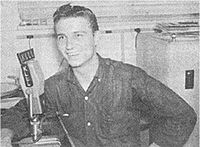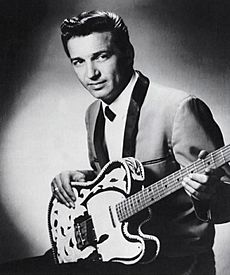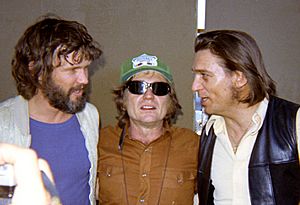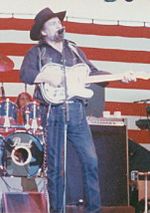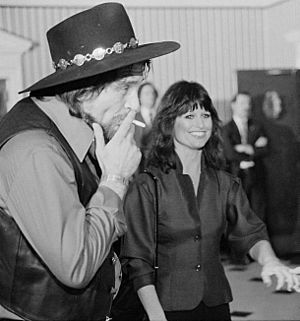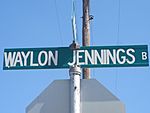Waylon Jennings facts for kids
Quick facts for kids
Waylon Jennings
|
|
|---|---|
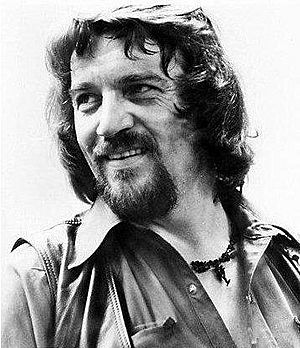
Jennings in 1974
|
|
| Born | June 15, 1937 Littlefield, Texas, U.S.
|
| Died | February 13, 2002 (aged 64) Chandler, Arizona, U.S.
|
| Occupation |
|
| Years active | 1949–2001 |
| Spouse(s) |
|
| Children | 6, including Shooter |
| Musical career | |
| Genres | |
| Instruments |
|
| Labels | |
| Signature | |
 |
|
Waylon Jennings (June 15, 1937 – February 13, 2002) was an American singer, songwriter, and musician. He was a pioneer of the Outlaw Movement in country music. This style of music was known for being more independent and less polished than the popular country music of the time.
Jennings started playing guitar when he was eight years old. By age fourteen, he was performing on KVOW radio. He then formed his first band, The Texas Longhorns. He left high school at sixteen to become a musician. He worked as a performer and DJ at various radio stations. In 1958, famous musician Buddy Holly helped Jennings record his first songs. Holly also hired him to play bass. Jennings famously gave up his seat on a plane in 1959. This plane later crashed, killing Holly, J. P. "The Big Bopper" Richardson, and Ritchie Valens.
After this, Jennings formed a rockabilly band called The Waylors. They became the house band at a club in Scottsdale, Arizona. He recorded for smaller labels but found real success when he moved to RCA Victor. He gained more control over his music and released popular albums like Lonesome, On'ry and Mean and Honky Tonk Heroes.
During the 1970s, Jennings became a leader in the outlaw country movement. He recorded Wanted! The Outlaws with Willie Nelson, Tompall Glaser, and Jessi Colter. This was the first country music album to sell over a million copies. He also had a big hit song called "Luckenbach, Texas". Jennings appeared in films and TV shows, including Sesame Street. He was also the narrator for The Dukes of Hazzard, singing its famous theme song. Later, he joined the country supergroup The Highwaymen with Willie Nelson, Kris Kristofferson, and Johnny Cash.
Jennings toured less after 1997 to spend more time with his family. He had some health problems between 1999 and 2001. In 2001, he was honored by being inducted into the Country Music Hall of Fame.
Contents
Waylon Jennings' Early Life
Waylon Jennings was born on June 15, 1937, near Littlefield, Texas. His parents were Lorene Beatrice and William Albert Jennings. His family had roots from Ireland and also included Cherokee and Comanche heritage.
His birth certificate said "Wayland," but his mother changed it to "Waylon." She did this after a preacher thought he was named after a university. Jennings later said he didn't like the name at first because it sounded "hillbilly," but he grew to accept it. His father moved the family to Littlefield and opened a creamery.
Waylon Jennings' Music Career
Starting in Music
When Jennings was eight, his mother taught him to play guitar. He practiced on relatives' instruments until his mother bought him his own. He was influenced by country legends like Hank Williams and rock and roll star Elvis Presley.
Jennings performed at family gatherings and local events. He won a talent show in Lubbock, Texas. At age 14, he got a weekly 30-minute show on KVOW radio in Littlefield. After this, he formed his band, The Texas Longhorns. Their mix of country and bluegrass music was not always popular.
At 16, Jennings left high school to focus on music. He worked odd jobs while pursuing his dream. He often played at country radio station KDAV. There, he met Buddy Holly. They became friends and Jennings often attended Holly's shows.
In 1956, Jennings became a DJ at KVOW and then moved to Lubbock. He played country music and early rock-and-roll. He was fired from one station for playing too much rock and roll. Later, he became the first DJ at KLLL, a new country station.
Buddy Holly, after returning from a tour, visited KLLL. Holly decided to help Jennings become his first artist. He helped Jennings with his image and arranged a recording session. On September 10, Jennings recorded songs with Holly. Holly then hired Jennings to play bass for his "Winter Dance Party Tour."
The Tragic Winter Dance Party Tour
The Winter Dance Party tour began in January 1959. The long distances between shows and broken-down buses made travel difficult. Because of this, Buddy Holly decided to charter a small plane for himself, Jennings, and Tommy Allsup.
Before their show in Clear Lake, Iowa, Allsup lost a coin toss and gave his seat to Ritchie Valens. Jennings then gave his seat to The Big Bopper, who was sick with the flu. Holly joked with Jennings, saying, "Well, I hope your ol' bus freezes up!" Jennings jokingly replied, "Well, I hope your ol' plane crashes!"
Less than two hours later, on February 3, 1959, Holly's plane crashed. Everyone on board died. This event is often called The Day the Music Died.
Jennings' family heard the news on the radio. He called them to confirm he was safe. Jennings and Allsup continued the tour for two more weeks. Jennings felt responsible for the crash for many years.
Moving to Phoenix
After the tour, Jennings returned to Lubbock. He was deeply affected by Holly's death. He worked briefly at another radio station. He then moved to Coolidge, Arizona, with his family. He found work performing at bars.
In Phoenix, he was offered a job as the main artist at a new club called JD's. Jennings formed his band, The Waylors, with Paul Foster, Jerry Gropp, and Richie Albright. They became very popular locally. Here, Jennings developed his unique rock-influenced country style.
In 1961, Jennings signed with Trend Records. He later signed with A&M Records in 1963. His songs didn't become big hits there because the label focused more on folk music. However, he had some regional success in Phoenix.
Country singer Bobby Bare heard Jennings' song "Just to Satisfy You" on the radio. Bare then called Chet Atkins, who was in charge of RCA Victor studios in Nashville. Bare suggested Atkins sign Jennings. In 1965, Atkins officially signed Jennings to RCA Victor. In August, Jennings had his first song on the Billboard country chart.
The Nashville Sound and Outlaw Country
In 1966, Jennings released his first RCA Victor album, Folk-Country. His songs started to climb the charts. His single "(That's What You Get) For Lovin' Me" became his first top 10 hit. In 1967, "Just to Satisfy You" was a hit. Jennings said this song showed the influence of Buddy Holly and rockabilly music on his style.
Jennings had more success with singles like "The Chokin' Kind" and "Only Daddy That'll Walk the Line". In 1969, he won a Grammy Award for "MacArthur Park" with The Kimberlys.
At this time, Jennings lived in Nashville with Johnny Cash. Jennings felt limited by the Nashville music industry. Producers wanted him to use studio musicians and follow a specific "Nashville sound." This style used orchestral arrangements and fewer traditional country instruments. Jennings wanted to play with his own band and choose his own songs. He felt he didn't have enough artistic freedom.
By 1972, Jennings was frustrated. He was sick and thinking about quitting music. His drummer, Richie Albright, convinced him to keep going and suggested he hire a new manager, Neil Reshen. Reshen helped Jennings get a better contract with RCA Records, giving him more money and, importantly, artistic control.
This new freedom led to a major change for Jennings. In 1973, he released Lonesome, On'ry and Mean and Honky Tonk Heroes. These albums were recorded with his own band and became very successful. More hit albums followed, like This Time and The Ramblin' Man. "This Time" became his first number one single.
In 1975, Dreaming My Dreams became his first album to sell over 500,000 copies, earning a gold certification. In 1976, Are You Ready for the Country topped the country charts for 10 weeks.
In 1976, RCA released Wanted! The Outlaws. This album featured Jennings, Willie Nelson, Tompall Glaser, and Jennings' wife, Jessi Colter. It was the first country music album to sell over a million copies. The next year, Ol' Waylon came out, with the hit duet "Luckenbach, Texas" with Willie Nelson. Their album Waylon and Willie (1978) included the popular song "Mammas Don't Let Your Babies Grow Up to Be Cowboys".
Jennings also released I've Always Been Crazy in 1978. He felt the "outlaw" image was becoming too much. In 1979, RCA released his first Greatest Hits album, which sold millions of copies.
Also in 1979, Jennings became the narrator for the TV series The Dukes of Hazzard. He wrote and sang the show's theme song, "Good Ol' Boys." This song became the biggest hit of his career. He even appeared in one episode as himself.
Later Years and Legacy
In the mid-1980s, Jennings joined Johnny Cash, Kris Kristofferson, and Willie Nelson to form the supergroup The Highwaymen. They released three successful albums. Jennings also released his own gold album, WWII (1982), with Willie Nelson.
In 1985, Jennings joined other famous artists to record "We Are the World" for charity. He later signed with MCA Records. His album Will the Wolf Survive (1985) reached number one on the country charts. In 1990, he signed with Epic Records, and The Eagle became his last top 10 album.
Jennings also appeared in the children's film Sesame Street Presents: Follow That Bird (1985). He played a truck driver and sang a song. In 1993, he recorded an album of children's songs called Cowboys, Sisters, Rascals & Dirt. He also had a small role in the movie Maverick (1994).
Even as his record sales slowed, Jennings continued to attract large crowds to his live shows. In 1998, he formed the group Old Dogs with Bobby Bare, Jerry Reed, and Mel Tillis.
In 1999, Jennings formed Waylon & The Waymore Blues Band. They performed until 2001. As his health declined, he decided to stop touring. In 2000, he recorded his final album, Never Say Die: Live.
Jennings' music was known for his strong, rough singing voice and unique guitar style. He used a special "phaser" effect and played with both his thumb and fingers. His signature look included long hair, a beard, a black hat, and a black leather vest.
Personal Life
Waylon Jennings had six children. He married country singer Jessi Colter in 1969. They had a son named Waylon Albright, who is known as Shooter Jennings. In 1997, at age 60, Jennings earned his high school diploma (GED). He did this to show his son the importance of education.
Illness and Death
Jennings faced health challenges, including Type II diabetes. In 1988, he had heart bypass surgery. By 2000, his diabetes worsened, making it hard for him to move around. He had surgery to improve blood circulation in his leg. In December 2001, part of his left foot was amputated.
On February 13, 2002, Waylon Jennings passed away in his sleep from complications of diabetes. He was 64 years old. He was buried in Mesa, Arizona.
Waylon Jennings' Legacy
Between 1965 and 1991, Waylon Jennings had 96 songs on Billboard's Hot Country Singles chart, with 16 reaching number one. Fifty-four of his albums charted, and eleven reached number one.
His hometown of Littlefield, Texas, renamed one of its main roads Waylon Jennings Boulevard.
In October 2001, Jennings was inducted into the Country Music Hall of Fame. In 2006, he was inducted into Guitar Center's RockWalk in Hollywood, California. In 2007, he received the Cliffie Stone Pioneer Award from the Academy of Country Music.
Jennings' music has influenced many artists, including Hank Williams Jr., Travis Tritt, Steve Earle, and his son, Shooter Jennings.
In 2008, a posthumous album called Waylon Forever was released. It featured songs recorded with his son, Shooter. In 2012, Goin' Down Rockin': The Last Recordings was released. These were songs Jennings recorded before his death, completed by his former bandmates. His family also started new projects to honor his legacy.
Awards
Waylon Jennings received many awards throughout his career:
- In 1970, he won a Grammy Award for "MacArthur Park" with The Kimberlys.
- In 1975, he was named Male Vocalist of the Year by the Country Music Association.
- In 1976, he won Album of the Year for "Wanted! The Outlaws" with Jessi Colter, Willie Nelson, and Tompall Glaser. He also won Vocal Duo of the Year and Single of the Year with Willie Nelson.
- In 1979, he won another Grammy Award with Willie Nelson for "Mammas, Don't Let Your Babies Grow Up to Be Cowboys."
- In 1985, he won Single of the Year with The Highwaymen for "Highwayman."
- He was inducted into the Texas Country Music Hall of Fame in 1999 and the Country Music Hall of Fame in 2001.
- In 2007, he received the Cliffie Stone Pioneer Award from the Academy of Country Music.
See also
 In Spanish: Waylon Jennings para niños
In Spanish: Waylon Jennings para niños
- Outlaw Country
- List of country musicians
- Inductees of the Country Music Hall of Fame
 | Tommie Smith |
 | Simone Manuel |
 | Shani Davis |
 | Simone Biles |
 | Alice Coachman |


